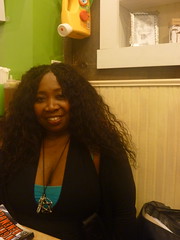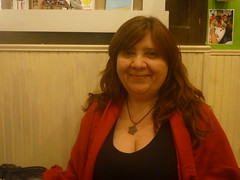 Hannah Rubenstein Starr Ravenhawk is a high priestess of the Wiccan Family Temple, which hosts its sixth annual witches ball on Sunday.
Hannah Rubenstein Starr Ravenhawk is a high priestess of the Wiccan Family Temple, which hosts its sixth annual witches ball on Sunday.This Sunday night is the one time of the year that a mere mortal can cavort with “real witches.”
The sixth annual Witches Masquerade Ball, at The Delancey in the Lower East Side, occurs on Halloween night. Billed as “A Night for all Vamps, Pagans, Witches, Druids, Goths, Faerie Folk, Magical Folk, Indigos & Urbanites,” the Ball regularly draws hundreds of guests to its Halloween festivities, which include performances by belly dancers, an ancestral drum circle, Indian pop singers, dancing, and what is mysteriously referred to as “a secret midnight ritual.”
“We’ll put a spell on you!” laughs Starr Ravenhawk, a high priestess of the Wiccan Family Temple that hosts the Ball.
Starr, co-founder of the Wiccan Family Temple, describes the Wiccan group as an “eclectic, improvisational, all-inclusive open circle” based in the East Village. Twice a month, in a rented storefront on East Ninth Street, a motley group of Wiccans and curious guests come together to practice the religion — recent offerings include “Witchcraft Ethics” and “Psychic Self-Defense” — in a public forum unimaginable in years past.
Starr has many monikers — real estate agent, minister, high priestess, mother, and independent business owner. Many people have told her that she bears a striking resemblance to Chaka Khan, and she does — if the singer wore a silver pentagram necklace and wove purple strands into her curls.
In addition to being co-founder of the temple, Starr runs an Academy of Pagan Studies for adults, Dragon Academy for children, and the New York City Pagan Council. Unlike virtually all other Wiccan groups in the area, Starr’s organizations are highly visible, with a Web site, myspace, and meetup group open to all. This public presence is not merely a byproduct of ubiquitous Internet access, but a deliberate choice that underpins Starr’s philosophy about Wicca in its modern form.
Wicca, which has its roots in Pagan worship, has only existed in its contemporary form for approximately 60 years, gaining popularity following the repeal of the Witchcraft Act of 1735 in 1951. Although beliefs vary amongst sects, most Wiccans today are polytheistic, believe in the existence of magic that can be manipulated through witchcraft and in reincarnation, and place a strong emphasis on preserving and worshipping nature. Against the backdrop of centuries of violence and persecution — think the Inquisition and Salem Witch Trials — the young religion is fractured and, for the most part, still shrouded in secrecy. But Starr believes that this isolation is detrimental to progress.
 Hannah Rubenstein Kathleen McArdle says members are often stigmatized when their disclose their affiliation with the temple. “We call it ‘coming out of the broom closet,’” she says.
Hannah Rubenstein Kathleen McArdle says members are often stigmatized when their disclose their affiliation with the temple. “We call it ‘coming out of the broom closet,’” she says.“When you say ‘witchcraft,’ people think ‘evil,’” Starr says, explaining a commonly-held misconception about the religion. “They look at you like you’re from another planet, like you’re an alien.” People have asked her whether she performs human sacrifices or murders babies as part of Wiccan rituals.
“More groups like us are needed to inform the general public so that they’re not afraid,” Starr says. “There’s still so much media misconception. If we don’t show that it’s not like what they believe, it’s going to be a constant battle to gain recognition as a bona fide religion.”
Starr’s friend and fellow temple member Kathleen McArdle says Wiccans are often stigmatized when they disclose their affiliation with the temple. “We call it ‘coming out of the broom closet,’” she says, a small smile on her lips.
Starr believes that by creating a visible presence that reaches out and welcomes the community, she can dispel archaic myths about her religion that taint public opinion and cast Wicca as a devil-worshipping cult. Even her mother, Starr says, doesn’t understand the religion. “She prays for me every day,” Starr says, resignation coloring her voice. “She thinks she’s saving me from evil.”
In addition to publicizing events and meetings, Starr considers education of the next generation of witches a crucial aspect to gaining acceptance and ensuring the longevity of her religion. Beginning in January, the temple will launch the Dragon Academy, a bi-monthly Sunday afternoon class aimed at introducing Wicca to children aged 5 to 13. The Academy, co-founded by Starr’s 12-year-old son Darien and taught by fellow High Priestess Luna Rojas, will offer lessons such as “The Different Reasons for Building an Altar” and “How to Write Your Own Spells.”
“We just want to raise our kids in our religion like anyone else,” Starr says.
“The fact that we are able to sit down and have a class without anyone trying to kill us —that’s a big deal,” she adds. “That’s progress.”



